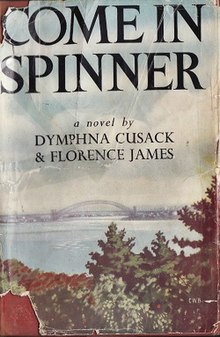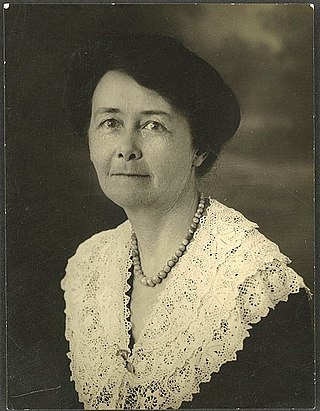
Stella Maria Sarah Miles Franklin, known as Miles Franklin, was an Australian writer and feminist who is best known for her novel My Brilliant Career, published by Blackwoods of Edinburgh in 1901. While she wrote throughout her life, her other major literary success, All That Swagger, was not published until 1936.

Mary Reibey née Haydock was an English-born merchant, shipowner and trader who was transported to Australia as a convict. After gaining her freedom, she was viewed by her contemporaries as a community role model and became legendary as a successful businesswoman in the colony.

Ellen Dymphna Cusack AM was an Australian writer and playwright.
Florence Gertrude James was an Australian writer and literary agent, born in New Zealand.
Red Sky at Morning is a 1944 Australian melodrama set during the 19th century based on a play by Dymphna Cusack. It features an early screen performance by Peter Finch, who plays a convict who falls in love with the wife of a sea captain.
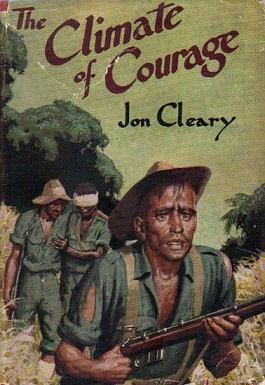
The Climate of Courage is a 1954 novel by Australian writer Jon Cleary. It was his fifth published novel. It is set during World War II and involves a group of Australian soldiers who have returned from service in the Middle East.
This article presents a list of the historical events and publications of Australian literature during 1951.
Say No to Death (1951) is a novel by Australian writer Dymphna Cusack. It was originally published in Australia by Heinemann, and later in the US by William Morrow under the title The Sun in My Hands.
Alice Campion is the pseudonym of a group of Australian writers who have published two collaborative novels, The Painted Sky, and The Shifting Light. The group promotes collaborative fiction writing through workshops, public lectures, and the internet.
The Square Ring is a 1952 play by Ralph Peterson.
Nigel Tasman Lovell was an Australian stage, radio, film and television actor, and producer of opera and both stage and radio drama.
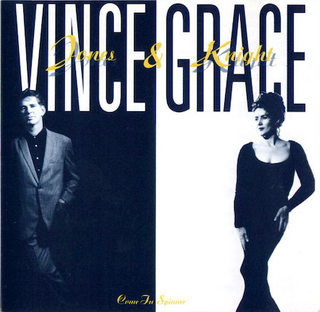
Come in Spinner is the soundtrack album to the Australian Broadcasting Corporation 1989/1990 television mini-series of the 1951 novel Come In Spinner by Dymphna Cusack and Florence James. The album is credited to Vince Jones and Grace Knight and peaked at number 4 on the ARIA Charts. Orchestral arrangements and conducting by Derek Williams and William Motzing were recorded at Paradise Studios, Sydney, with Martin Armiger as Producer.
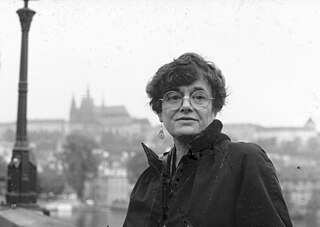
Marilla North is a biographer and cultural historian, working in Australian women’s literary history. Her teaching career has spanned over 50 years in public education at primary, secondary and tertiary levels, where she has specialised in Life Writing.
Stand Still Time is a 1946 Australian play by Dymphna Cusack. It was adapted for radio and British television.
The Playwrights' Advisory Board was an Australian organisation established in 1938 to assist the cause of Australian playwriting. It was established by Leslie Rees, Rex Rienits and Doris Fitton. Its functions included negotiating productions with theatres, acting as an intermediary in the nomination and collection of royalties, advising theatres and playwrights on scripts, and holding script competitions. Members of the board included names such as Dymphna Cusack and Sumner Locke Elliott.
Red Sky at Morning is a 1935 Australian stage play by Dymphna Cusack. The play helped launch Cusack's writing career and was filmed in 1943.
Morning Sacrifice is a 1942 Australian stage play by Dymphna Cusack. It was based on Cusack's experience as a school teacher.
Lure of the Island Sea is a 1945 Australian radio play by Dymphna Cusack about Charles Sturt. It was one of Cusack's main radio plays and was recorded in Melbourne.
Shoulder the Sky is a 1945 Australian radio play by Dymphna Cusack, based on her stage play, about canteen workers in Newcastle.
Shallow Cups is a 1933 Australian play by Dymphna Cusack.
